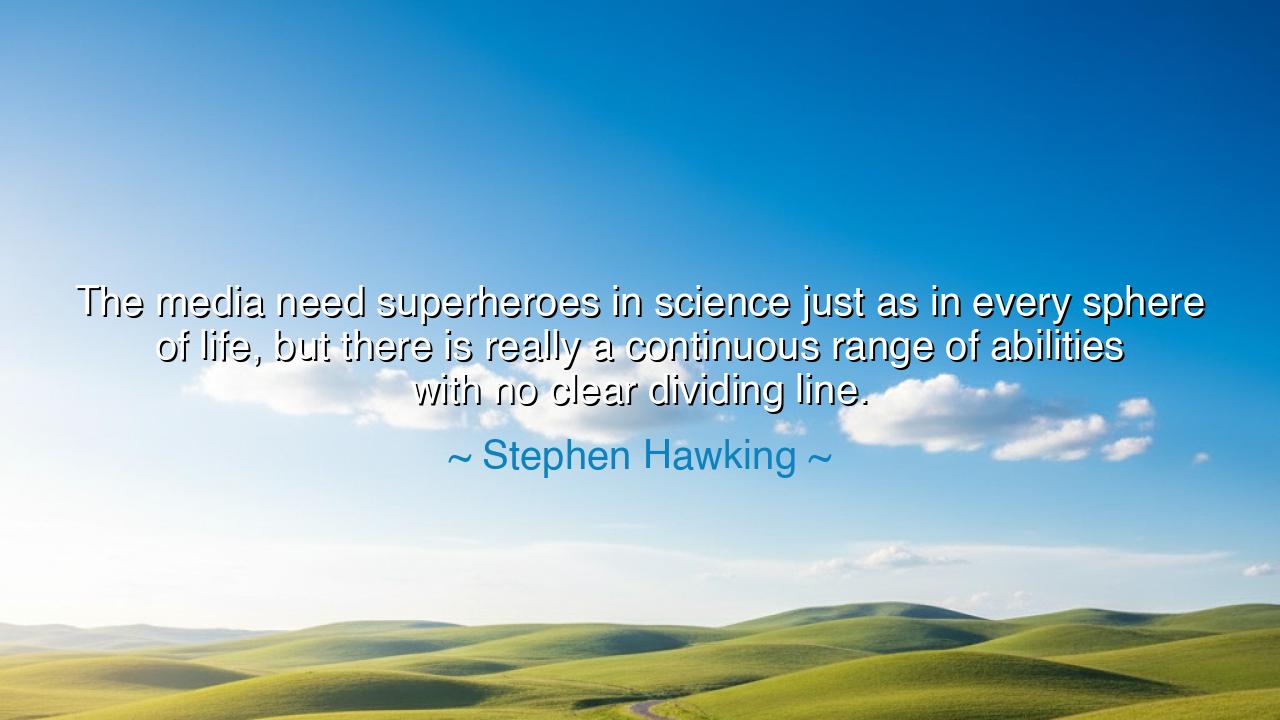
The media need superheroes in science just as in every sphere of
The media need superheroes in science just as in every sphere of life, but there is really a continuous range of abilities with no clear dividing line.






Listen now, O seekers of wisdom, to the profound words of Stephen Hawking: "The media need superheroes in science just as in every sphere of life, but there is really a continuous range of abilities with no clear dividing line." These words speak to the heart of human nature and the way we view the world and its greatest minds. In every corner of society, from the battlefields of history to the streets of today, we seek heroes, figures who stand above the rest, who embody the qualities of greatness in a way that inspires awe. In science, as in any other field, the media and the public crave these larger-than-life figures—the superheroes—who seem to possess an almost mythical genius, someone who can defy the ordinary and achieve the extraordinary.
Consider, O wise ones, the ancient myths that have been passed down through the ages. The heroes of old—Hercules, Achilles, Odysseus—were not just men, but embodiments of ideals and virtues that reached beyond the capabilities of ordinary mortals. These were figures who seemed to transcend the limits of the human experience, whose feats were so grand that they became legendary. But in reality, the heroes of old were not without flaws, and their stories were not meant to show us perfection, but to illustrate the greatness of the human spirit in overcoming immense challenges. Just as Hawking observes, we seek out these figures in our own age, especially in science, but we must remember that true greatness is not an extreme at one end of a spectrum but exists in a range that spans the abilities of all who strive.
Hawking’s words remind us of an important truth: superheroes in science are often seen as towering figures, like Einstein, Newton, or Marie Curie, whose intellect and achievements seem far beyond those of ordinary people. They are revered as titans of knowledge, their discoveries shaping the very foundation of our understanding of the universe. Yet, Hawking invites us to see that the abilities of these minds are part of a broader spectrum, and that true brilliance is not confined to a select few who shine brightest, but is present in many forms. There is, as he says, "a continuous range of abilities," and the greatness of science is built upon the work of countless individuals, each contributing in ways that may not always capture the spotlight but are no less essential to progress.
Think, O wise ones, of Galileo Galilei, a man who was far from the superhero of his time. Galileo faced not only opposition from the authorities of the Church but also isolation and ridicule for his beliefs about the heliocentric nature of the universe. His work was not immediately recognized as groundbreaking, and his life was filled with struggle. Yet his contributions, though they did not grant him the status of an ancient hero, laid the foundations for modern astronomy and physics. Galileo’s greatness was not in being the loudest or most celebrated figure, but in his quiet persistence and dedication to uncovering the truth—a truth that would, in time, change the course of history.
Consider also the story of Rosalind Franklin, whose contributions to the discovery of the DNA double helix were largely overshadowed during her lifetime. While James Watson and Francis Crick received much of the acclaim for the discovery, it was Franklin's meticulous X-ray images that were crucial to unlocking the mystery of life’s molecular structure. Though not celebrated as a superhero in her time, Franklin's work has since been acknowledged as integral to one of the greatest scientific breakthroughs of the 20th century. This teaches us that science is not about isolated figures towering above others, but about the collective effort of many, each contributing their part to the great tapestry of knowledge.
The lesson here, O seekers, is one of humility and perspective. We must recognize that greatness in science does not lie in the myths of a few individuals but in the quiet persistence of many. The superheroes we celebrate are but the public faces of a far greater community of thinkers, each contributing their part in the ongoing pursuit of truth. Hawking’s wisdom urges us to acknowledge that all contributions—whether from the widely celebrated or the unnoticed—are part of the same ongoing quest for knowledge, each step leading us forward. It is the collective human spirit, with its vast range of abilities, that fuels the advancement of understanding.
Therefore, O wise ones, as you walk the path of discovery, remember that your own contributions, no matter how small they may seem, are part of the greater whole. Do not measure yourself against the heroes of your time, but know that your dedication and work ethic will build the future just as theirs did. The true greatness of science lies not in the exceptional few but in the everyday pursuit of truth by all who seek it. Let us embrace the continuous range of abilities that exist within each of us, and in doing so, we become part of the grand legacy of discovery, ever-moving forward in our understanding of the world.






AAdministratorAdministrator
Welcome, honored guests. Please leave a comment, we will respond soon